Northern Beaches Hospital: Inside the engine room of a COVID-19 clinic
Thousands of people are getting COVID-19 tests everyday, but what’s happening behind the scenes? We visit a clinic on the northern beaches on what turns out to be its busiest day ever.
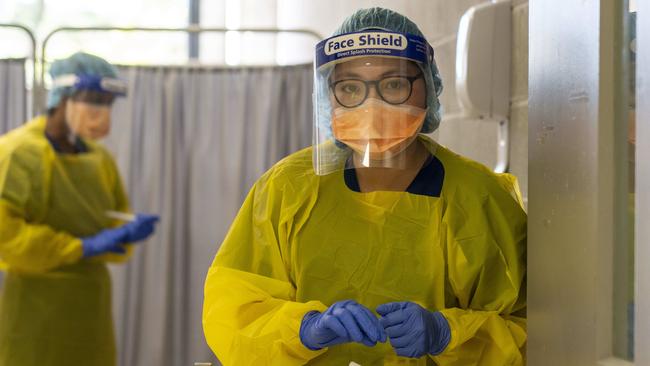
Manly
Don't miss out on the headlines from Manly. Followed categories will be added to My News.
- Why all Hayfever sufferers should get COVID-19 tests
- Not one cold in 135 days at aged care home with tough restrictions
The engine room of the Northern Beaches Hospital’s COVID-19 clinic is a constant hive of activity.
It’s 10am on a Tuesday – normally one of the busiest of the week – and staff haven’t stopped since it opened at 8am.
There are between nine and 11 staff in the clinic most days with around three to four nurses in full PPE (Personal Protective Equipment) doing tests in the ‘Red Zone’.
The others are in the engine room, the administrative centre of the clinic.
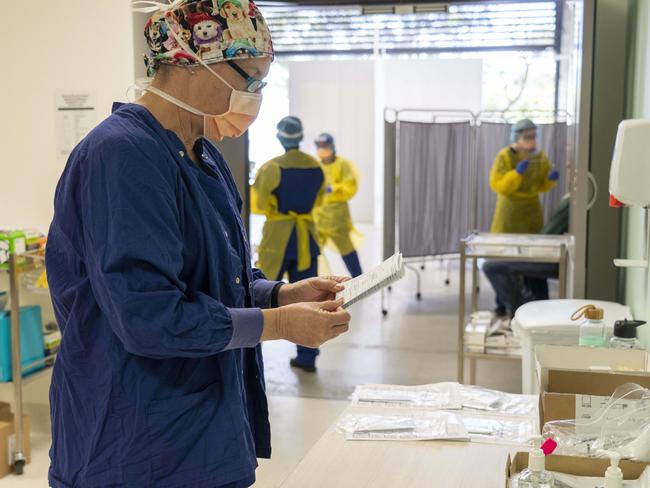
Here staff process the patient’s details in the computer system, collect the swabs and match with the corresponding paperwork and drop them into a bucket for someone to transfer to the courier.
One of the nurses in the ‘engine room’ is Judy Bradbury, complete with a mask and a cute dog patterned hair covering.
Mornings are often the busiest and this is rush hour in the COVID clinic.
“People like to get their tests out of the way at the beginning of the day,” she says, as she moves back and forth between the printer, the computer, the desk and the edge of the ‘Red Zone’ where she collects the swabs.
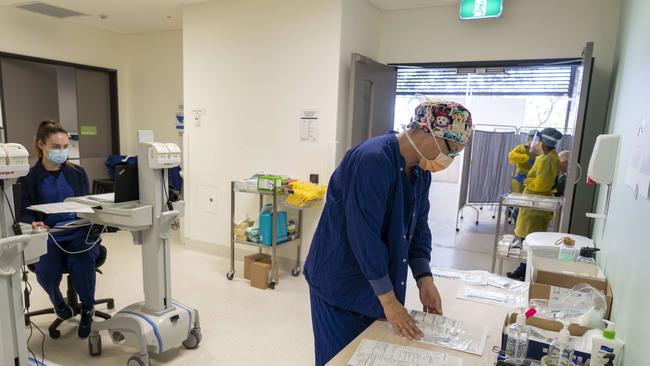
She says it’s hard to predict when there will be a quiet period, sometimes there simply isn’t one.
On a slow day staff process around 200 tests. A very busy day will see upwards of 400.
Judy predicts this could be a 400 test day.
We later discover the clinic has a record day with more than 477 people tested.
Every few minutes a nurse in full PPE waits at the door of the engine room with a swab, ready to be bagged. Often three are waiting, if it’s really busy.
Judy goes to the edge of the ‘Red Zone’ where the tests are being done with a clear zip-lock plastic bag ready with the corresponding patient’s details already inside and a nurse drops the swab into it.
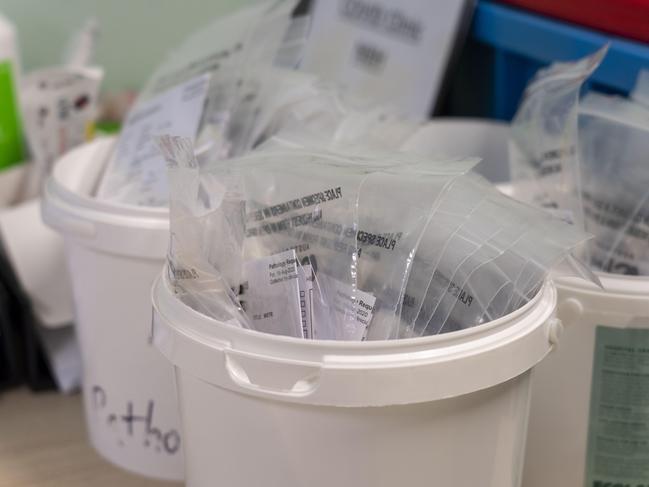
She then drops it into one of several buckets, which fill rapidly, and which are then picked up by another member of staff and taken to a courier who will take them to a pathology laboratory off site.
There’s an onsite laboratory but there are simply too many tests for them to process on top of the work they already do for the regular patients in the hospital.
Patients receive their results via a text on their mobile phones within 24 to 48 hours.
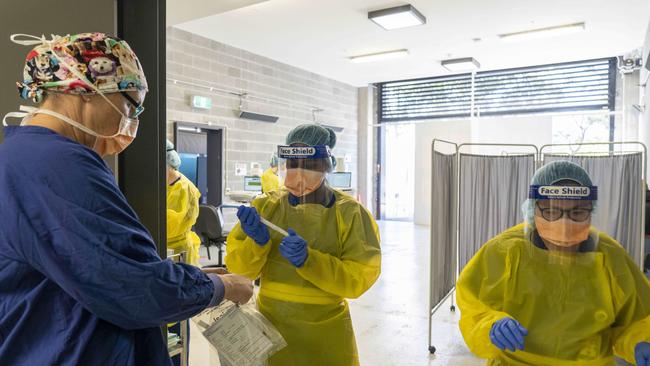
Through the doorway is the ‘Red Zone’, where patients are tested.
That space, which is effectively a huge garage with roller doors, was originally built to be a processing area for those with mental health issues or those displaying challenging behaviour caused by alcohol or drugs.
It is large enough for police or emergency service vehicles to drive into and drop off patients.
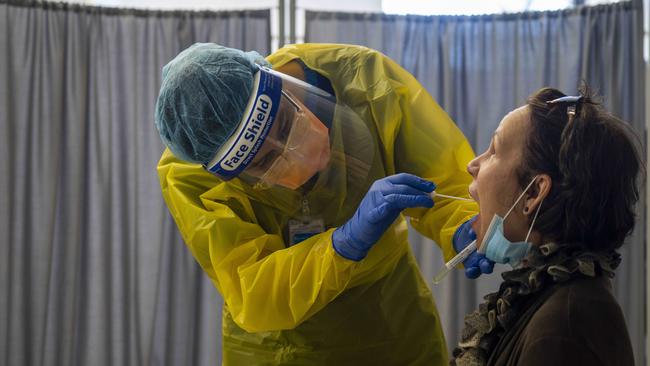
However, it was never used for that purpose because in practise it is too removed from the clinical triage area.
But it has turned out to be a perfect spot for a COVID-19 clinic. It is big and airy with the roller doors up.
To make staff more comfortable heaters have been installed.
Airconditioners are being brought in for summer.
There are also plans to expand the triage area which is at the front of the clinic and provide toilets.
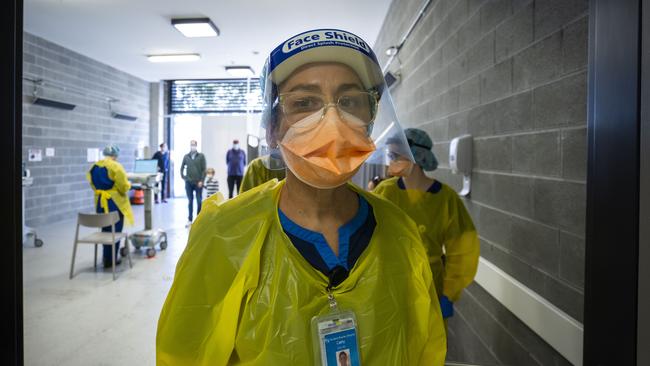
This pandemic doesn’t seem to be going away anytime soon.
To keep the clinic running as smoothly as possible, patients coming in for tests can drive up to the entrance and park for free, meaning potentially infectious people are not having to walk through the main hospital car park, where other hospital patients are also parking.
At busy times security guards control the traffic waiting for spaces to become available.
Patients are then checked in by a triage nurse and either wait in a short line, or sit in their cars and wait to be called.
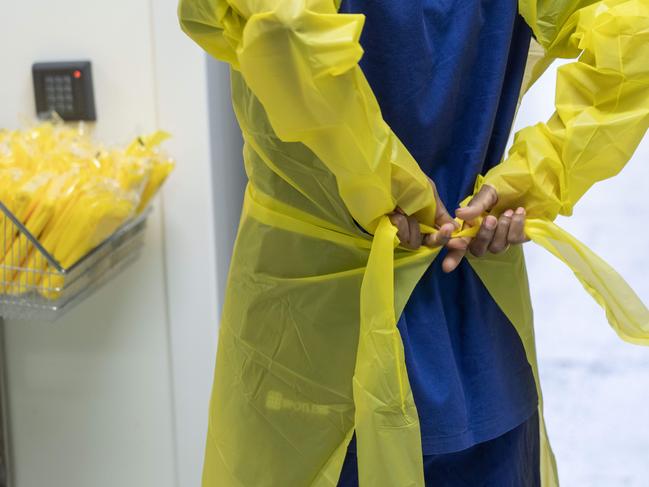
Clinical Nurse Consultant ED, Cathy Morris, says the clinic has evolved since it first opened in March and now it operates like a one-way system so people drive in one way, walk round the clinic one way and out another, to minimise crossing over with other patients.
She praised the enormous number of northern beaches residents who have done the right thing and got tested.
She says some have been more than once and that is welcomed.
Although the clinic has not had a positive swab since March – when they saw a number of passengers from the Ruby Princess – the virus is still circulating in Sydney.
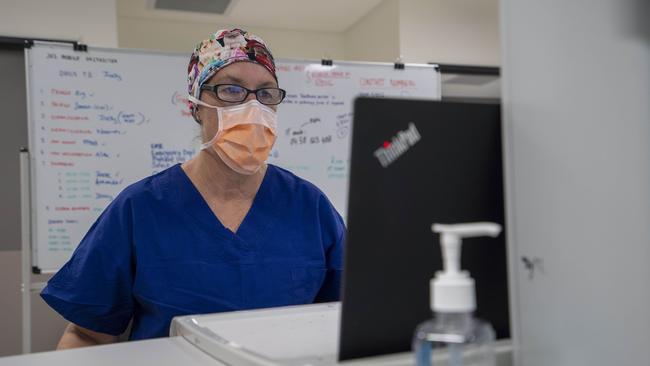
Cathy says Victoria’s second wave has reminded people that it could come back with a vengeance.
“If you have any of the symptoms, if you have been to any of the hot spots, or are just worried, come in for a test,” she says.
“You’re doing a good community service.
“It’s really important everyone does the right thing.”
While the process can take around 15 minutes if there is no wait, it can take up to an hour when it’s busy, so she appealed to people to be patient.
“Bring a good book,” she says.
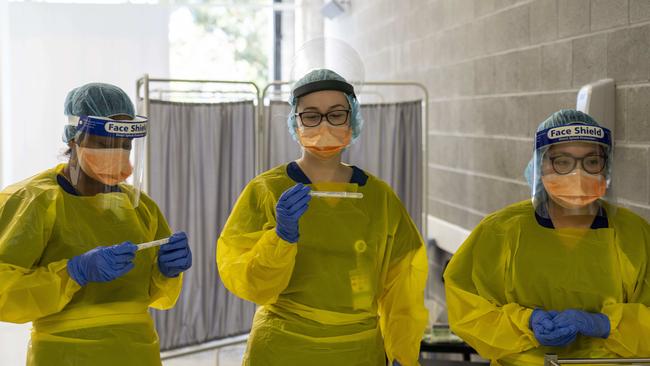
Jo Watts, head of nursing in the Emergency Department, says there are experienced ED staff in the clinic, such as Cathy Morris, and regular agency staff to cope with the extra work in ED. All have undergone rigorous training to ensure they are safe while they work.
She says pre-COVID there were around 200 ED patients a day.
“The number of people coming into ED dropped off at the start of COVID, like everywhere else, but it has picked up again and now the hospital is busier than ever,” Jo says.
“We are seeing up to 220 ED patients, plus those coming in for COVID tests. Sometimes that’s 600 a day.”
Later it is revealed that the number of COVID swabs taken on Tuesday, August 18, when we visited was 477, a record for the clinic.
And, the total number of those who went through ED was 639, again a record.
More than 77 per cent were respiratory presentations, another record.
In total staff at Northern Beaches Hospitals have undertaken more than 27,000 COVID swabs this year.
Cathy, who is so busy in the clinic she doesn’t have lunch until after 2pm that day, appealed to people to treat staff kindly.
“Wearing a mask and everything is uncomfortable,” she says.
“We may call someone ahead of you if we think they’re really ill, or sometimes it is not intentional.
“So please be patient and kind.”
The clinic at the hospital is open seven days a week from 8am to 5pm.

